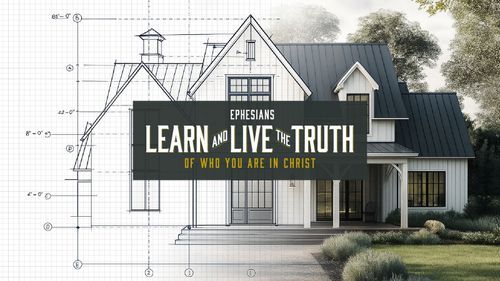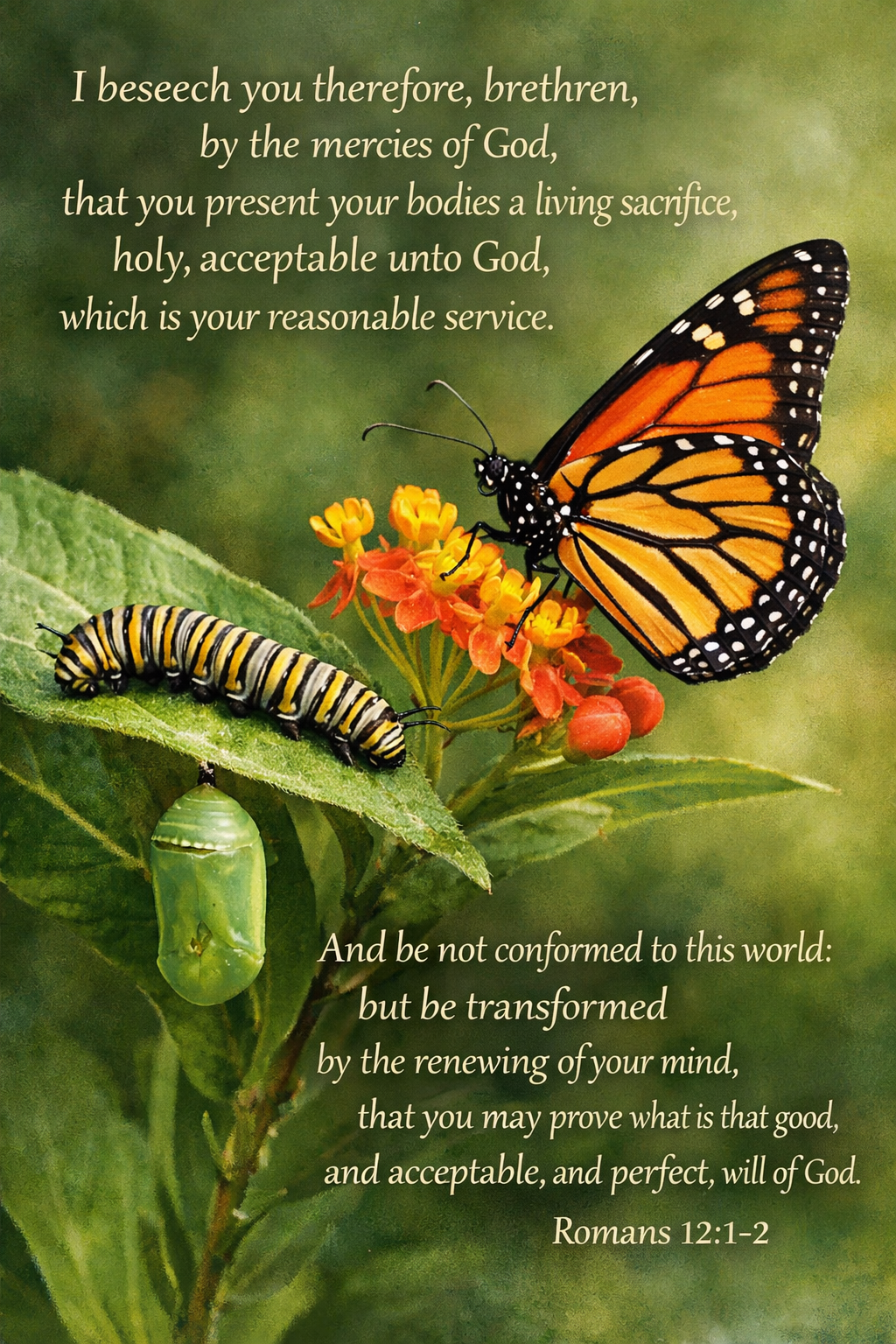
In today’s verses at the beginning of Matthew 23, Jesus speaks against the fleshly religion of the Religious Leaders.
Title: The Danger of Fleshly Religion
When we think of the term “fleshly,” we tend to only think about people taking license with sin.
We think of someone being lazy or lustful.
But someone can be very hardworking in fleshly religious pursuits.
A person can be doing many impressive things for God.
They can be earning ALL the gold stars by their name as far as other people are concerned.
But if they’re working in their trying to do it all in their own power their actually being fleshly about it.
Indications of this can be these.
If they do what human teachers tell them to do in order to impress those teachers, they’re being fleshly
If they serve to be noticed for fleshly purposes, they’re actually glorifying themselves rather than God
If they serve to be noticed by God and make Him happy with them, they misunderstand the gospel.
And this too is fleshly religion.
You might be feeling right now like saying, “It feels like I can’t even serve God the right way.”
And I don’t want to make you feel that way,
But I think our verses this morning are going to help you understand what I’m talking about.
And Jesus will bring us back to the pure beauty of a gospel relationship with God.
So don’t worry that this sermon is just another list of what not to do wrong.
We step into Matthew 23 to hear Jesus’ closing argument against the fleshly religion around Him.
Matthew 23:1-12
1 Then Jesus said to the crowds and to his disciples, 2 “The scribes and the Pharisees sit on Moses’ seat, 3 so do and observe whatever they tell you, but not the works they do. For they preach, but do not practice. 4 They tie up heavy burdens, hard to bear, and lay them on people’s shoulders, but they themselves are not willing to move them with their finger.
5 They do all their deeds to be seen by others. For they make their phylacteries broad and their fringes long, 6 and they love the place of honor at feasts and the best seats in the synagogues 7 and greetings in the marketplaces and being called rabbi by others.
8 But you are not to be called rabbi, for you have one teacher, and you are all brothers. 9 And call no man your father on earth, for you have one Father, who is in heaven. 10 Neither be called instructors, for you have one instructor, the Christ.
11 The greatest among you shall be your servant. 12 Whoever exalts himself will be humbled, and whoever humbles himself will be exalted.
Following Jesus’ instruction here, I want to challenge you this morning -
DON’T FOLLOW FLESHLY TEACHERS. (1-7)
1 Then Jesus said to the crowds and to his disciples, 2 “The scribes and the Pharisees sit on Moses’ seat, 3 so do and observe whatever they tell you, but not the works they do.
Jesus here gives His closing argument on the temple mount.
He’s speaking to the crowd that gathered in Jerusalem for Passover.
He recognizes the role of the religious leaders, specifically mentioning the scribes and Pharisees.
The scribes were the experts on the text of the Mosaic Law.
The Pharisees were the theologians that worked out the details/implications of the Mosaic Law.
These two groups were notorious for interpreting the Mosaic Law to create detailed rules for how a person could ensure that they are following it.
It’s hard to tell if Jesus is speaking tongue-in-cheek or not when He tells the crowd to listen to the teaching of these leaders.
He describes them as those who speak with authority from the Mosaic Law.
This is what’s meant that they sit on Moses’ seat.
And the structure of the statements would basically mean, “as much as they speak for the Law of Moses, do what they say.”
But His “zinger” is that, while they should do what these leaders tell them to do, no one should follow the example of how they live.
Jesus is accusing the religious leaders of working from a standard of “Do as I say, not as I do.”
He continues on, explaining why He advises the crowd that that don’t follow the example of the leaders.
For they preach, but do not practice.
1st -they don’t practice what they preach.
Kenneth Wuest translates this as, “they are always discoursing and not doing.”
The truth is that when a person teaches that we can make God happy with us/make ourselves more acceptable to Him, we end up having to consider some rules as less important than others.
It could look like this -“If you want God to let you into heaven, you better obey Him in everything”
And that starts with being in church every time the doors are open.
And you better read your Bible and make sure you do everything in moderation.
But if you ask that teacher,
“Speaking of moderation, your waistline seems to not exactly preach a message of moderation.”
To that the teacher might say, “Hold on now. Does Paul tall us to ‘BUFFET’ our bodies?! Hahaha!”
If a person teaches “You better mind your “P’s” & “Q’s” to get God to love you,” you’ll find that they usually excuse letting a few other letters drop away from their own attention.
4 They tie up heavy burdens, hard to bear, and lay them on people’s shoulders, but they themselves are not willing to move them with their finger.
The Mosaic Law, called the “Torah,” was the foundation of the Pharisaical rules
This is the law that God gave through Moses to the Jewish people of the Old Testament
The Mishnah were additional teachings and sayings by Jewish rabbis
These were meant to interpret the original Mosaic Law.
Many of these additional teachings applied the Law very specifically.
The Pharisees prided themselves on following not just the letter of the Mosaic Law, but even the letter of the Mishnah/interpretation.
5 They do all their deeds to be seen by others.
The Pharisees especially wanted to abide by the outward laws that distinguished the Jewish people from other people.
These would be the “P’s” & “Q’s” that they would choose to emphasize.
Jesus tells His disciples in -
* John 12:43 43 they loved the glory that comes from man more than the glory that comes from God.
For they make their phylacteries broad and their fringes long,6 and they love the place of honor at feasts and the best seats in the synagogues 7 and greetings in the marketplaces and being called rabbi by others.
These items that Jesus mentions were and still are worn by Orthodox Jews when they pray.
Phylacteries are boxes that Orthodox Jewish men still wear on their foreheads when they pray.
The command to have Scripture on one’s mind were originally taken figuratively (memorize).
But at some point the tradition developed to literally “bind the scripture” on their forehead.
Fringes - Each tassle was to represent the individual commands of the Law. The Pharisees made them as large as possible to show that they were far more spiritual than the average person.
Is this wrong to do? -Not necessarily.
What Jesus is pointing out is the fleshly motivation of being noticed by others.
Jesus gives a list of the things the religious hypocrites do for the purpose of being seen by others.
Other examples from next week’s verses:
16 “Woe to you, blind guides, who say, ‘If anyone swears by the temple, it is nothing, but if anyone swears by the gold of the temple, he is bound by his oath.’
18 And you say, ‘If anyone swears by the altar, it is nothing, but if anyone swears by the gift that is on the altar, he is bound by his oath.’
23 “Woe to you, scribes and Pharisees, hypocrites! For you tithe mint and dill and cumin, and have neglected the weightier matters of the law: justice and mercy and faithfulness.
Paul warned against the same things in
* Colossians 2:16–19 16 Therefore let no one pass judgment on you in questions of food and drink, or with regard to a festival or a new moon or a Sabbath. 17 These are a shadow of the things to come, but the substance belongs to Christ.
There was a popular Christian book that gave instruction to parents on how to teach their kids to obey.
From what I understand it was very helpful with a lot of good points.
But what was unfortunate is that, for some, it became a fleshly legalism.
Parents were actually judging each other’s families based on how well they had the phrases and steps down pat.
The author attended John MacArthur’s church.
And the whole situation actually threatened to split the church because people created an unbiblical standard of who was a good Christian parent and who wasn’t.
Don’t Follow Fleshly Teachers
Fleshly Church people aren’t comfortable with the grace that the Bible teaches.
Fleshly teachers aren’t comfortable with a relationship with Jesus that doesn’t require you to do some work to secure salvation for yourself.
They want to see you check off a box of a work or two in order for you to say, “I did this on this day.”
Our salvation is based on the work of Christ and is evidenced by the Holy Spirit indwelling us.
And He indwells us forever.
Fleshly teachers aren’t comfortable with you being assured by the Holy Spirit that you have received Christ and have been forgiven of all you have done or will do.
They tend to hold your salvation over your head like you could lose it at any minute if you do something really bad.
They’re comfortable with a salvation that you is based on your actions and your commitment.
Now, We are called to love God by obeying Him.
It’s a problem that crops up when we accept a system of rules to obey but disengage the heart.
Our obedience is to be an expression of our love for God.
This isn’t about saying, “Don’t sweat the small stuff.”
The small stuff of disobeying God gets in the way of our “tasting and seeing that the Lord is good.”
And the Holy Spirit and good counsel should help us to discern our disobedience.
This also does NOT mean we can disobey until we can obey out of love.
Disobedience kills our love for God.
What we must do is keep in mind that our obedience is intended to be an expression of our hearts.
We should seek to love God more and more and express it with our obedience.
We must resist more and more detailed rules that we thing make us into super Christians.
Instead, we should follow God’s lead to obey Him in whatever additional ways better help us to love Him.
The fleshly teacher actually pushes the Christian away from obedience because he encourages him to try with all of his OWN might for his OWN glory.
Moving on to v.8-10, I hope to challenge you with this -
DON’T CHASE FLESHLY FLATTERY. (8-10)
8 But you are not to be called rabbi, for you have one teacher, and you are all brothers. 9 And call no man your father on earth, for you have one Father, who is in heaven. 10 Neither be called instructors, for you have one instructor, the Christ.
Jesus isn’t warning His followers about being called rabbi or teacher or instructor.
He’s warning them about seeking titles or distinction for themselves like these.
He’s warning against human systems of rank and regcognition infiltrating the church.
Instead, He emphasizes that He is their rabbi, teacher, or instructor.
They in turn are brothers to one another.
This is a title that we take for granted these days.
In the 1st century, to consider someone a brother or sister was to speak of the closest social relationship.
And obviously, it’s a relationship of equality.
But it’s a relationship of equal elevation -elevated to the follower/ambassador of the King of all Kings.
A major point that Jesus is getting at is that His disciples have Jesus/the Christ as their teacher.
And we have God as our Father.
What if a corporal walked up to a 4-Star General and said, “Hey, Beauford, how’s it going?”
The General would blow his top.
And the corporal would probably end up in the brig.
And in the military system, that’s how it’s supposed to be.
He’s supposed to stand at attention, salute, and say something like “Sir, General, sir."
And the General can basically act however he wants toward the corporal.
Apply -
I’m not disparaging they military
I’m just saying that we’re supposed to be different.
Josh Carpenter has attended Harvest for over 15 years….
All of us stand on the same footing before God.
We all stand in the righteousness of Christ…
Lastly, we’re reminded by some common teachings of Jesus popping up again, and they warn us -
DON’T SETTLE FOR WORLDLY EXALTATION. (11-12)
11 The greatest among you shall be your servant.
Jesus has similar things to both of these statements.
He spoke about how other leaders exalt themselves and lord over others -
* Matthew 20:26–27 26 It shall not be so among you. But whoever would be great among you must be your servant, 27 and whoever would be first among you must be your slave,
He spoke about the necessity of humility and used a child’s innocence as His example.
* Matthew 18:4 4 Whoever humbles himself like this child is the greatest in the kingdom of heaven.
Brought together, these statements highlight the unconventional approach of Jesus’ followers.
Rather than grasping at recognition and honor from others, as followers of Jesus, we’re to entrust ourselves to His righteous judgment.
We’re to stand in faith on the fact that God sees all.
He recognizes our efforts and accomplishments.
And we’re to understand, as we stand in Christ’s righteousness, all we do for the Lord is an offering of worship and thanksgiving.
12 Whoever exalts himself will be humbled, and whoever humbles himself will be exalted.
Jesus follows in the tradition of many of the Proverbs, warning us about exalting ourselves.
To exalt means to try to enhance someone’s honor, fame, position, or power
To be humbled means to have a reversal of status -from high prestige to being humiliated.
Jesus warns that the person who tries to enhance their own status will be humiliated.
And the person that chooses the place of low honor will, in the end, be given prestige by God.
These principles are true in everyday life in how we relate to each other.
But, more importantly, they are true when it comes to a relationship with God.
Recall from His Sermon on the Mount that this is how Jesus began His preaching with the Beatitudes.
He pointed to the basis of salvation being humility before God -recognizing we need God’s forgiveness
* Matthew 5:3–6 3 “Blessed are the poor in spirit, for theirs is the kingdom of heaven. 4 “Blessed are those who mourn, for they shall be comforted. 5 “Blessed are the meek, for they shall inherit the earth. 6 “Blessed are those who hunger and thirst for righteousness, for they shall be satisfied.
For salvation, our responsibility is to recognize our sinful hearts and lives and God’s provision of His righteousness in Christ…
In this context, those who humble themselves as the sinners they are and reach out for salvation through Christ are exalted into the family of God, standing in the righteousness of Christ.
And to each other, we’re brothers and sister in Christ.
Think of the gospel illustration that we looked at a few weeks ago.
The illustration explains Romans 6:23
* Romans 6:23 23 For the wages of sin is death, but the free gift of God is eternal life in Christ Jesus our Lord.
This is the one that places the person separated by God by a huge chasm that cannot be crossed in their own power.
The fleshly teacher might tell the person to get a good running start and jump as far as they can.
But no amount of effort is going to help them get to the other side on their own.
This is literally what is meant by –
* Romans 3:23 23 for all have sinned and fall short of the glory of God,
It requires a person recognizes their inability to save themselves, for them to see what God has provided
As CH Spurgeon said, “Man is never so near grace as when he begins to feel he can do nothing at all.”
Don’t Settle for Worldly Exaltation
Aren’t you glad that Jesus frees us from human systems of rules and reg


